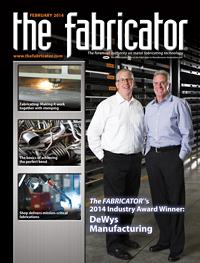Senior Editor
- FMA
- The Fabricator
- FABTECH
- Canadian Metalworking
Categories
- Additive Manufacturing
- Aluminum Welding
- Arc Welding
- Assembly and Joining
- Automation and Robotics
- Bending and Forming
- Consumables
- Cutting and Weld Prep
- Electric Vehicles
- En Español
- Finishing
- Hydroforming
- Laser Cutting
- Laser Welding
- Machining
- Manufacturing Software
- Materials Handling
- Metals/Materials
- Oxyfuel Cutting
- Plasma Cutting
- Power Tools
- Punching and Other Holemaking
- Roll Forming
- Safety
- Sawing
- Shearing
- Shop Management
- Testing and Measuring
- Tube and Pipe Fabrication
- Tube and Pipe Production
- Waterjet Cutting
Industry Directory
Webcasts
Podcasts
FAB 40
Advertise
Subscribe
Account Login
Search
How millennials will make a difference
Fabricators work to unleash engaged curiosity
- By Tim Heston
- February 28, 2014
- Article
- Shop Management
Who are millennials? Technically, they’re people born between the early 1980s and early 2000s, as defined by demographer Neil Howe, who coined the term in 1991. For fab shop owners and managers, many are entry-level employees.
The stereotype of this generation has all sorts of unflattering adjectives. They’ve been coddled. They feel entitled to earn a big paycheck right out of the starting gate, even though they don’t show up to work on time and can’t pass a drug test. All of this essentially just rephrases the curmudgeonly “these kids today” sigh of disappointment, frustration, and misunderstanding from adults of every generation. The truth is a little more complex, of course, and perhaps more optimistic.
Howe himself has a different perspective. As he recently explained to an NPR reporter, “When you talk to young people today, they say they want to be good neighbors, good citizens. A record share say they want to someday get married and have kids. And if you ask them the favorite way to spend their time, they say it’s with their family. Here’s a question: Was there ever a time when older people said, ‘You know, [the youth of today] are just right.’”
Millennials grew up with the computer as an appliance, not an invention. If you are having trouble with computers or modern 3-D control interfaces, a millennial can probably help. But most notably, Howe said, they want to make a meaningful impact on the world around them. They want to make a difference.
At least at some level, don’t we all? This probably isn’t true for every soul on the planet (not much is, really), but most of us want to spend at least some portion of our lives doing something that engages us.
People find that engagement in their personal lives. The challenge is trying to unleash that engagement at work. As John Axelberg, president of General Sheet Metal Works in South Bend, Ind., recently told me, “I want passionate curiosity in my company.”
If you think about it, there isn’t a big leap between “passionate curiosity” and “meaningful impact.” People are usually passionate about something because they affect something or someone in a meaningful way, be it themselves or others. The challenge is having a structure in place that helps unleash passionate curiosity and engagement.
In October, at LeanFab Workshop & Tours, sponsored by the Fabricators & Manufacturers Association International®, attendees talked about how to get that employee engagement, to motivate, and provide incentive. At the conference, some shop leaders said they provided bonuses and other monetary incentives for improvement ideas. Others said they didn’t believe in that approach, stating that lean initiatives ideally should make life on the shop floor easier, less hectic, and more controlled. The incentive to develop and communicate those new ideas ideally should be “baked in” the shop culture.
How do you bake it in? A common management mantra is to “think like an owner.” Many in this business take it one step further and make employees themselves owners. Employee stock ownership programs (ESOPs) are often associated with small companies, but some rather large metal fabrication companies have ESOPs—Mayville, Wis.-based Mayville Engineering Co. (MEC), a $300 million-a-year behemoth, being one of them. For three years running, MEC has topped this magazine’s FAB 40 list of the top contract metal fabricators in the U.S.
Employees are stockholders; they don’t vote on every decision. But as the company does better, so does their retirement plan. ESOPs help tie the long-term company growth with long-term employee wealth. In the short term, bonus programs and profit sharing serve a similar role.
But it isn’t all about money. As LeanFab attendees discussed, there needs to be something deeper, too, and it goes back to company culture. A company may have great profit-sharing or incentive programs, but those are icing on the cake. If the cake itself (the company culture) tastes terrible, those programs on their own won’t help the company become more successful.
As LeanFab Workshop leader Dick Kallage, principal at Barrington, Ill.-based KDC & Associates, explained, a good culture connects with the customer. Employees know why customers buy from them, and though price is always a factor, it’s not the only one. “Visits to the customers’ production facilities are often very useful to gauge the cost of poor service and quality,” he said. “So are talks with customers’ operations and quality management.”
Another contract fabricator on last year’s Fab 40 list, Waseca, Minn.-based Corchran Inc., also happens to be an ESOP. But, of course, the ESOP alone doesn’t make the company successful. Joel Matheson, CEO and president, and Tom Westphal, senior vice president of operations, described how their team regularly visits customers, ask questions, and digs deep to uncover what companies really need. This in turn drives improvement efforts on the floor. The company has procedures in place, along with an incentive program (more icing on the cake), that encourage employee education and idea generation.
“We listen to our employees,” Westphal said. “They are owners of the company. The people on the shop floor are the real experts at what we do. We’re here to service them. And we listen to the customer. We’ve been at this awhile. We know what works, what doesn’t. We listen to the customer, and give suggestions on manufacturing their product.”
That pretty much sums up the core selling point of contract metal fabrication.
Corchran does a fair amount of whole-goods manufacturing, in which the shop handles the entire manufacturing of a product, and ships it from the fab shop floor directly to their customers’ customers. It also does component work—jobs that customers potentially could bring in-house during tough times. During good times and bad, sources said, the company works to diversify, gain more work from existing customers, and remain competitive and reliable to ensure current customers become or remain long-term partners.
It all comes back to good communication, which makes workplaces easier, more engaging, and positive. In other words, if you have an idea for improvement, you can make a difference. For millennials, that’s very good news.
The 2014 Fab 40, a list of the top contract metal fabricators in the U.S., will appear in the June issue. For more information, visit www.thefabrica tor.com/fab40. For information on participating, visit www.fma-communications.com/fab40/.
About the Author

Tim Heston
2135 Point Blvd
Elgin, IL 60123
815-381-1314
Tim Heston, The Fabricator's senior editor, has covered the metal fabrication industry since 1998, starting his career at the American Welding Society's Welding Journal. Since then he has covered the full range of metal fabrication processes, from stamping, bending, and cutting to grinding and polishing. He joined The Fabricator's staff in October 2007.
subscribe now

The Fabricator is North America's leading magazine for the metal forming and fabricating industry. The magazine delivers the news, technical articles, and case histories that enable fabricators to do their jobs more efficiently. The Fabricator has served the industry since 1970.
start your free subscription- Stay connected from anywhere

Easily access valuable industry resources now with full access to the digital edition of The Fabricator.

Easily access valuable industry resources now with full access to the digital edition of The Welder.

Easily access valuable industry resources now with full access to the digital edition of The Tube and Pipe Journal.
- Podcasting
- Podcast:
- The Fabricator Podcast
- Published:
- 04/16/2024
- Running Time:
- 63:29
In this episode of The Fabricator Podcast, Caleb Chamberlain, co-founder and CEO of OSH Cut, discusses his company’s...
- Trending Articles
Steel industry reacts to Nucor’s new weekly published HRC price

How to set a press brake backgauge manually

Capturing, recording equipment inspection data for FMEA

Are two heads better than one in fiber laser cutting?

Hypertherm Associates implements Rapyuta Robotics AMRs in warehouse

- Industry Events
16th Annual Safety Conference
- April 30 - May 1, 2024
- Elgin,
Pipe and Tube Conference
- May 21 - 22, 2024
- Omaha, NE
World-Class Roll Forming Workshop
- June 5 - 6, 2024
- Louisville, KY
Advanced Laser Application Workshop
- June 25 - 27, 2024
- Novi, MI



























